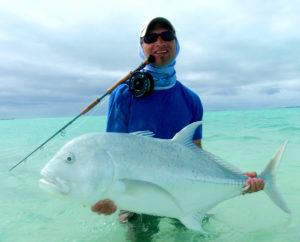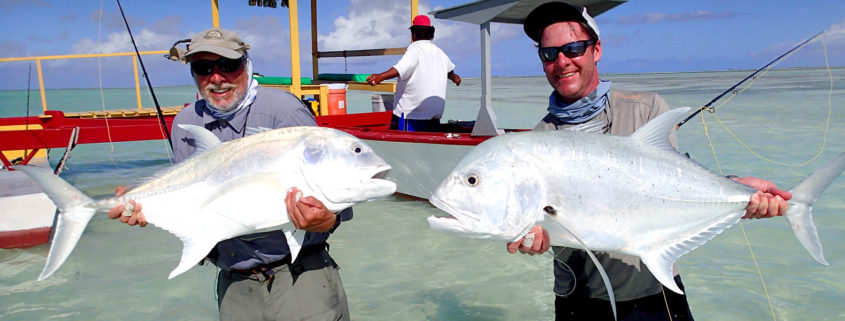The Trevally of Kiritimati
Giant, golden or blue trevally, take your pick as Christmas Island has them all, and in abundance. Not only are they there for the guided fly fisherman, the DIY enthusiast will have amble opportunities at these brutes.

Christmas Island Trevally
Giant Trevally
Whether guided or fishing the flats alone, if you want a legitimate shot at a giant trevally, you will need to have your line stripped out, your rod (10 weight at a minimum) in one hand and fly in the other. As we typically are prowling the flats with a bonefish rod in hand, you’ll have to put it aside to hunt GT. There is just not enough time to switch rods when you happen upon one. These fish are generally on the move and do not stick around very long. If they happen to see you, they’re gone in a silvery flash. Where the flats meet the deeper water are the best places to set up your ambush.
Blue Trevally
Blue trevally are much easier to fool. They will happily eat a bonefish fly, triggerfish crab or trevally fly. As they generally fall in the 5-15lb range, you can, with finesse, land one on your 7 or 8 weight rod. These fish will show anywhere on the flat and will aggressively chase a fly. The blue line along the dorsal fin of the blue trevally helps to distinguish it from the giant.
Golden Trevally
The permit of the Christmas Island, the golden trevally, can often be found in a couple feet of water tailing after crabs. If you happen to have one swim by you, the telltale red lips will let you know it’s a golden. Larger crab patterns are a must for these fish. If you can stick one, pat yourself on the back as they are the most difficult to catch of the trevally. These fish can reach 40 lbs., so you’ll want to commit to fishing for them and have your 10 weight at the ready. These fish look similar to the giants, but will have a few golden spots along the side, and the bright red lips.
All three species of trevally will show up on different flats at different tides. If you have a favorite bonefish flat, pay attention to the tides when you start seeing trevally, especially the giants. Truth is, it isn’t easy to catch any of these species, but the rewards for patience can get you a once-in-a-lifetime fish!




